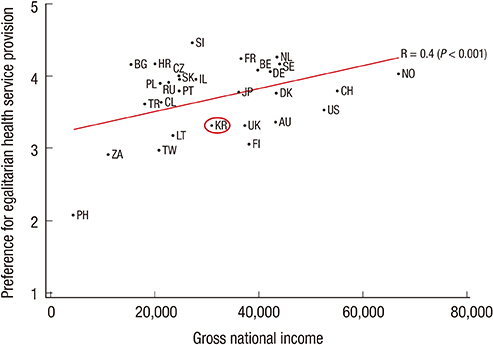J Korean Med Sci.
2015 Jun;30(6):676-681. 10.3346/jkms.2015.30.6.676.
Egalitarian Health Policy Preference and Its Related Factors in Korea: National Representative Sample Survey
- Affiliations
-
- 1Department of Social and Preventive Medicine, School of Medicine, Sungkyunkwan University, Suwon, Korea. pjaehyun@skku.edu
- KMID: 2160592
- DOI: http://doi.org/10.3346/jkms.2015.30.6.676
Abstract
- Recently in Korea, the commercialization of health services has come to the fore, and the issue of egalitarianism/universal coverage in health is a matter for debate. This study explored the extent of Korean citizen's preference for egalitarian health policies focusing on the provision of health care service, financing and related factors. The data came from the 2011 Korean General Social Survey (KGSS) and the International Social Survey Program (ISSP). The preference for an egalitarian health policy (dependent variable) was divided into a preference for an egalitarian health services provision (ES) and a willingness to contribute (WC) to it. Each index was linearly regressed with demographic factors, socioeconomic status, ideology, and health-related factors. ES was significantly associated with an individual's egalitarianism and political liberalism, having illness/disability, having no additional private health insurance, and their perception of health insurance coverage. WC was associated with age, sex, household income, education, egalitarianism, and their perception of health insurance coverage. There were evidently different factors between ES and WC, mainly socioeconomic factors. WC was strongly influenced by socioeconomic status, whereas ES seemed to be linked more closely to economic affordability. Moreover, the results showed that Korean citizens prefer ES but do not like WC. These results deserve great attention, and the authorities should keep it in perspective. If the government wants to make a successful attempt to change the healthcare system through public policy, it will need to take public preferences into account.
MeSH Terms
-
Adolescent
Adult
Age Distribution
Aged
Aged, 80 and over
Consumer Behavior/*statistics & numerical data
Employment/statistics & numerical data
Female
*Health Policy
Health Services Accessibility/*statistics & numerical data
Humans
Income
Male
Middle Aged
Patient Preference/*statistics & numerical data
*Politics
Republic of Korea/epidemiology
Sex Distribution
Social Class
Socioeconomic Factors
Surveys and Questionnaires
Universal Coverage/*statistics & numerical data
Young Adult
Figure
Reference
-
1. Lynch J, Gollust SE. Playing fair: fairness beliefs and health policy preferences in the United States? J Health Polit Policy Law. 2010; 35:849–887.2. Abasolo I, Tsuchiya A. Understanding preference for egalitarian policies in health: are age and sex determinants? Appl Econ. 2008; 40:2451–2461.3. Evans DB, Etienne C. Health systems financing and the path to universal coverage. Bull World Health Organ. 2010; 88:402.4. Abásolo I, Tsuchiya A. Egalitarianism and altruism in health: some evidence of their relationship. Int J Equity Health. 2014; 13:13.5. Navarro V, Muntaner C, Borrell C, Benach J, Quiroga A, Rodríguez-Sanz M, Vergés N, Pasarín MI. Politics and health outcomes. Lancet. 2006; 368:1033–1037.6. Schoen C, Davis K, How SK, Schoenbaum SC. U.S. health system performance: a national scorecard. Health Aff (Millwood). 2006; 25:w457–w475.7. Bezruchka S. The hurrider I go the behinder I get: the deteriorating international ranking of U.S. health status. Annu Rev Public Health. 2012; 33:157–173.8. Amsden AH. Why isn't the whole world experimenting with the East Asian model to develop?: Review of the East Asian miracle. World Dev. 1994; 22:627–633.9. Kim DS. Introduction: health of the health care system in Korea. Soc Work Public Health. 2010; 25:127–141.10. Kang MS, Jang HS, Lee M, Park EC. Sustainability of Korean National Health Insurance. J Korean Med Sci. 2012; 27:S21–S24.11. Monroe AD. Public opinion and public policy, 1980-1993. Public Opin Q. 1998; 6–28.12. Koch JW. Political rhetoric and political persuasion: the changing structure of citizens' preferences on health insurance during policy debate. Public Opin Q. 1998; 209–229.13. Blekesaune M, Quadagno J. Public attitudes toward welfare state policies a comparative analysis of 24 nations. Eur Sociol Rev. 2003; 19:415–427.14. Feldman S, Steenbergen MR. The humanitarian foundation of public support for social welfare. Am J Polit Sci. 2001; 658–677.15. Kim YS. Welfare politics and welfare state: problems and reform issues from the institutional view. In : . Health policy and politics: health meets politics. Seoul: Korean Academy of Critical Health Policy;2012. p. 129–154.16. Bambra C, Fox D, Scott-Samuel A. Towards a politics of health. Health Promot Int. 2005; 20:187–193.17. Shin YJ. Breaking the myths of health and politics. In : . Health policy and politics: health meets politics. Seoul: Korean Academy of Critical Health Policy;2012. p. 155–201.18. Kim SW. A comparison of the characteristics of general social surveys in east asia. Sungkyun J East Asian Stud. 2004; 4:137–154.
- Full Text Links
- Actions
-
Cited
- CITED
-
- Close
- Share
- Similar articles
-
- Factors Affecting the Preference for Hospitals Over Clinics in Primary Care in Korea
- How Much Does My Work Affect My Health? The Relationships between Working Conditions and Health in an Italian Survey
- The Role of Academic Journal in Health Policy
- Cohort profile: Singapore’s nationally representative Retirement and Health Study with 5 waves over 10 years
- Association of Mental Health and Health-Related Quality of Life with Household Food Insecurity Status among a Representative Korean Population



